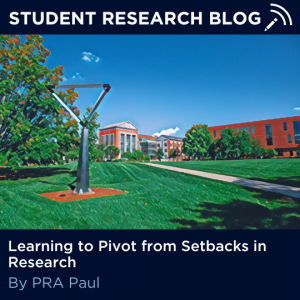By Paul Isaac, Peer Research Ambassador
 Most research articles that you’ll read in Nature or Science will come across as immaculately performed. The data will look amazing, every test and statistical analysis appears carefully orchestrated to elucidate a meaningful result. However, what doesn’t come across is the extensive string of trial and error involved with actually completing these projects and fleshing out the research questions they aim to answer.
Most research articles that you’ll read in Nature or Science will come across as immaculately performed. The data will look amazing, every test and statistical analysis appears carefully orchestrated to elucidate a meaningful result. However, what doesn’t come across is the extensive string of trial and error involved with actually completing these projects and fleshing out the research questions they aim to answer.
Mistakes, setbacks, and failures are natural parts of life and are just as naturally occurring in the lab. As you begin to get involved with research, you’ll inevitable hit your first roadblocks: accidentally pipetting the wrong reagent and messing up an assay, getting results that are the exact opposite of what you were expecting, and the dreaded experience of performing statistical analysis only to be met by non-significant results. During these moments, it’s easy to feel like you’re not “good enough” for research, that your hypotheses were fundamentally wrong, or that your research has hit a dead end. But, just like Rocky said, “It’s not about how hard you can hit; it’s about how hard you can get hit and keep moving forward.” If anything, good researchers aren’t defined by how good they are at getting their questions and results “right” the first time, but how well they can correct, pivot, and investigate their mistakes.
While the Rocky quote might help with your mood, what can you do when you experience setbacks in research? While I can’t provide you with an exhaustive list, I can provide you with some approaches that have worked for me throughout my research journey.
1. Smart research design
When approaching any research question or idea it’s important to come in prepared with backup plans A, B, and C. When I first got involved in research, I had ambitious and extremely optimistic project ideas in mind that would only succeed if steps 1 to 10 worked perfectly. Thankfully it was my PI who hit me with a healthy dose of reality as she helped point out the dozen problems or setbacks that could happen at any point in my proposed project. Together we brainstormed back-up plans and alternate directions I could take as each problem popped up, all of which I ended up using when I finally executed the final project. More so than having a backup plan, it’s important to design your research approach in a way that allows you to say something meaningful regardless of whether you get negative or positive results.
2. Looking closer at unexpected findings
Sometimes unexpected findings, contamination, and failed runs happen for a reason that we as researchers don’t know yet. Investigating these mistakes to better understand their cause, instead of throwing everything out and returning to the drawing board, can often lead to entirely new and meaningful findings. Alexander Fleming didn’t set out to discover penicillin but began by investigating a mold contamination that had occurred while he was on vacation. If Fleming in a moment of frustration decided to just throw out the plates, our discovery of antibiotics might have come decades later.
3. Learning lessons and moving on
While some mistakes need to be pivoted around and others are worth following up on, some mistakes are just simple instances of human error. Things like skipping a step in a protocol or forgetting to add primers to your PCR happen from time to time and you better believe almost every PI and graduate student has made a similar mistake at one point in time in their career. Whenever these mistakes happen, what’s most important is taking a meaningful lesson from them instead of holding it against yourself. Start checklisting steps in a protocol to make sure you keep track of where you are or start double checking the volumes of tubes in between pipetting steps to make sure that values match up. While tips like these are commonly thrown around the lab, they’re easy to forget and ignore until that valuable mistake comes along and helps you internalize and understand that advice.
At the end of the day, beyond serving as a requirement for graduate school and other professional programs, undergraduate research is supposed to be a safe space for you to make these mistakes and understand concepts beyond what you learn in class or from a textbook. Real research is messy, convoluted, and you often end up discovering something that’s the complete opposite of what you set out to do. So, the next time you accidentally trip and spill all of your bacterial cultures, just consider it as an opportunity to practice some more cell culture technique.
Paul is a senior majoring in Molecular & Cell Biology and Diagnostic Genetic Sciences, and minoring in Bioinformatics. Click here to learn more about Paul.